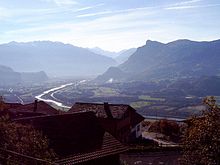up at the young Rhein
| up at the young Rhein | |
|---|---|
| country |
|
| Usage period | 1963 – today |
| text | Jakob Josef Jauch |
| melody | Henry Carey (controversial) |
| Sheet of music | JPG |
| Audio files | MP3 |
Up on the young Rhine is the national anthem of Liechtenstein .
history
The national anthem of Liechtenstein was given its current form in 1963, when the song Oben am Deutschen Rhein , which had been used as an anthem since the end of the 19th century, was changed by replacing text passages that referred to German or Germany .
The original text was written by Jakob Josef Jauch (1802-1859) in the 1850s . The melody used is that of the United Kingdom's national anthem (God Save the Queen) . The first demonstrable performance in front of a large audience took place at the opening of the national exhibition in Vaduz in 1895, and at that time the anthem seems to have been well known.
Attempts to delete the term "German" from the text had been made since 1918. They initially met with resistance and the reformed and original versions were controversial until the 1940s. Despite renewed attempts immediately after the Second World War , the references to Germany were not officially removed until 1963: “on the German Rhine” became “on the young Rhine”, and “in the German fatherland” became “the expensive fatherland”. The second original stanza with “Auf Deutschlands Wacht” has no counterpart in the current hymn.
It is customary to stretch your right arm straight up when the lines "Long live the Prince of the Country" and "High our Fatherland" are heard. But since this can be similar to the Hitler salute, stretching out one's arm is no longer practiced by many today.
text
Text: Jakob Joseph Jauch (1802–1859) written in 1850, melody: “God save the Queen”.
| Original text (1920–1963) | Text (since 1963) |
|---|---|
|
Up on the German Rhine |
At the top of the young Rhine |
See also
literature
- Josef Frommelt: The Liechtenstein national anthem. Origin, introduction, changes. In: Yearbook of the Historical Association for the Principality of Liechtenstein 104 (2005) pp. 7–67.
Web links
- Josef Frommelt: National anthem. In: Historical Lexicon of the Principality of Liechtenstein .
Individual evidence
- ↑ Frommelt: National Anthem , pp. 39–45.
- ↑ The Month - Magazine for Liechtenstein . August 2008, p. 22 (PDF; 2.5 MB) - In a 1995 survey of 260 Liechtenstein residents, 181 stated that they were familiar with this custom. 135 respondents adhered to it, 106 not. 39 of them rejected him because he was reminiscent of the Hitler salute - Frommelt: Landeshymne , p. 63 u. 51 f ( page no longer available ).

